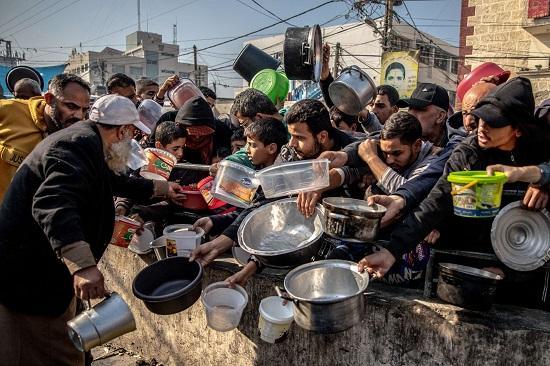How Israel Uses Financial Control As A Tool Of Collective Punishment Against Palestine
30th May 2024

Israel's finance minister, Bezalel Smotrich, announced on May 22 that Israel will withhold Palestinian tax revenues from the Palestinian Authority in the West Bank "until further notice". The move came on the same day that Norway, Spain and Ireland announced that they will recognise a Palestinian state.
These funds constitute between 60% and 65% of the Palestinian public budget. Withholding them will have a devastating effect both on a Palestinian government already in financial crisis and on the lives of the Palestinian people.
This is not the first time Israel has withheld funds that provide basic goods and services to people in the West Bank and Gaza. Israel has used this tool six times since the peace accords of the 1990s, when it began collecting tax on behalf of the Palestinian Authority.
The first episode occurred in 1997 on account of violence between settlers and Palestinian people in the West Bank. The EU had to step in to cover the Palestinian Authority's operational expenditures, and the US eventually pressured Israel to transfer the revenues later that year to maintain peace negotiations.
Then, in 2000, Palestinians staged a major uprising against Israeli occupation, known as the Al-Aqsa intifada (or the the second intifada). Israel accused the Palestinian government of financing terrorist activities during the uprising. Despite the fact that no evidence was found to support the allegations, Israel withheld tax revenues again, this time for two years - the longest period it has ever done so.
By 2002, the Palestinian Authority's revenue had dropped by 79%. And public sector employees, who at the time made up 26% of those working inside the West Bank and Gaza, went without their full wages for the entire period.
Violence in the Palestinian territories and Israel intensified until 2005. The West Bank and Gaza suffered immense destruction, with the cost of replacing the damaged infrastructure estimated at US$1.7 billion (£1.3 billion). And Israeli forces turned many cities, towns and villages in the West Bank into restricted military zones, placing residents under curfew for days at a time. This together pushed the Palestinian government to the brink of financial collapse.
The next episode happened in 2006, when Hamas won legislative elections and assumed administrative control of the Gaza Strip and West Bank. From March 2006 to July 2007, Israel withheld tax revenue worth an estimated US$1.1 billion. This froze most government activities, including essential public services in health and education, and caused a dramatic economic downturn.
Under the leadership of EU, international donors intervened to provide direct financial support to Palestinians. This included providing social allowances for some unpaid government employees and financial assistance for low-income families. But, at the request of Israel, this financial support bypassed the Palestinian Authority and was channelled through alternative mechanisms.
In 2011, Israel suspended tax revenues for one month after the Palestinian Authority applied for recognition of the Palestinian state in the UN General Assembly. And then, in early 2015, Israel withheld tax revenues for a sixth time after the Palestinian Authority applied to join the International Criminal Court.
Between 2000 and 2017, the Palestinian Authority sustained US$6.6 billion in losses as a result of the delayed revenue transfers. This was largely due to the loss of interest earned and the borrowing costs of alternative financing. Yet Israel has never compensated the Palestinian Authority for these costs.
In addition to withholding revenues, Israel unilaterally deducts bills for electricity, water, health, sewage and court orders before sending a net revenue amount to Palestine. In 2019, for instance, Israel deducted US$43 million from the Palestinian Authority budget: a sum it claimed Palestine had paid to the families of Palestinians who had been jailed or killed as a result of attacking Israel.
Consequences for Palestinian people
Israel is using financial control as a tool of collective punishment against Palestine. It is a strategy that has severely harmed the Palestinian economy and, as a consequence, the wellbeing of its people.
The World Bank estimates that 21% of the Palestinian population were already considered poor - living on just US$2.10 (£1.64) per day - on the eve of the second intifada. This figure had surged to about 60% by December 2002, two years after Israel suspended the delivery of tax revenue for a second time.
When tax revenues are withheld, many Palestinians are forced to reduce their food and educational expenditure, as well as their access to health services. For example, the average daily food consumption of a poor person in the West Bank and Gaza in 1998 was equivalent to US$1.47 per day. This had slipped to US$1.32 by early 2002 - a direct consequence of Israel withholding tax revenue for two years.
The cumulative effect of these suspensions has strangled the Palestinian economy and society, contributing to a cycle of poverty and deprivation. The new announcement will only exacerbate these conditions, worsening the plight of Palestinians in the region.
Authors
Shahzad Uddin
Professor of Accounting, University of Essex
Dalia Alazzeh
Lecturer in Accounting and Finance, University of the West of Scotland
Note
This article is from The Conversation web site To read it with links to more information go HERE
Top Biden aide blasts Israel for withholding Palestinian tax revenues
[url=https://theconversation.com/norway-ireland-spain-recognise-palestinian-statehood-what-this-means-for-middle-east-peace-expert-qanda-230729]Norway, Ireland, Spain recognise Palestinian statehood what this means for Middle East peace - expert Q and A[/url]
